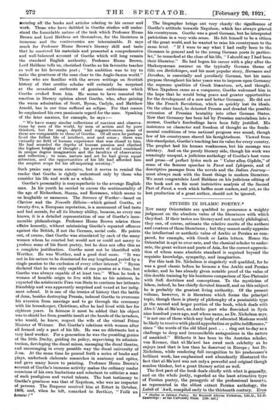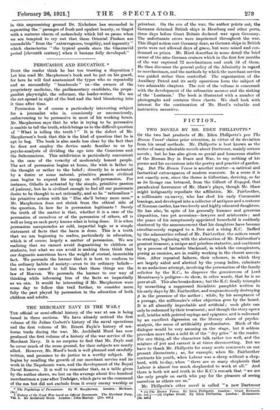STUDIES IN ISLAMIC POETRY.*
NOT many Orientalists are qualified to pronounce a weighty judgment on the absolute value of the literatures with which they deal. If their tastes are literary and not merely philological, they can, of course, estimate the relative merits of the authors and creators of those literatures ; but they cannot easily appraise the intellectual or aesthetic value of Arabic or Persian as com- pared, for example, with Greek or Latin letters. Hence the Orientalist is apt to over-rate, and the classical scholar to under- rate, the great writers and poets of Asia, for the correct apprecia- tion of whom some absolute standard is required beyond the requisite knowledge, sympathy, and imagination.
For this task Dr. Nicholson is singularly well qualified, for he was a good classic before he became a fine Arabic and Persian scholar, and he has already given notable proof of the value of this double training by his luminous comparison of Neo-Platonist with Sufi doctrines and conceptions. To the mysticism of Islam, indeed, he has chiefly devoted himself, and on this subject he is probably the greatest living authority. Of the present volume, however, it is literature which forms the principal topic, though there is plenty of philosophy of a pessimistic type in the second and larger portion of the book, which deals with Abu-1--'Ala al-Ma'arri, an Arabic poet who flourished in Syria nine hundred years ago, and whose name, as Dr. Nicholson says, " is not one of those which any body of educated Moslems would be likely to receive with placid approbation or polite indifference," since " the words of the old blind poet . . . ring out to-day as a challenge to deep and irreconcilable antagonisms in the nature of mankind." Hitherto it has been to the Austrian scholar, von Kremer, that al-Ma'arri has owed such celebrity as he enjoys (and that is less than he deserves) in Europe ; but Dr. Nicholson, while rendering full recognition to his predecessor's brilliant work, has emphasized and abundantly illustrated the fact that al-Ma'arri was not only a powerful and original though sombre thinker, but a great literary artist as well.
The first part of the book deals chiefly with what is generally, and on the whole justly, regarded as the least attractive type of Persian poetry, the panegyric of the professional laureate, as represented in the oldest extant Persian anthology, the Lubdb of 'Awfi, compiled early in the thirteenth century. Even
• Studies in lslamie Podry. By Reynold Alley's) Nicholson, Litt.D., LL.D. Cambridge : at the Univendty Prem. me: net.] in this unpromising ground Dr. Nicholson has succeeded in separating the „" passages of fr eala and opulent beauty, or tinged with a matures charm of melancholy whieh bid us pause when we are tempted to cry out that, these. Oriental Pindars are unreadable " from the "extravagance, turgidity, and ingenuity" which characterize " the typical gasida since the Ghaznavid period [eleventh century] when it became fully developed."



































 Previous page
Previous page